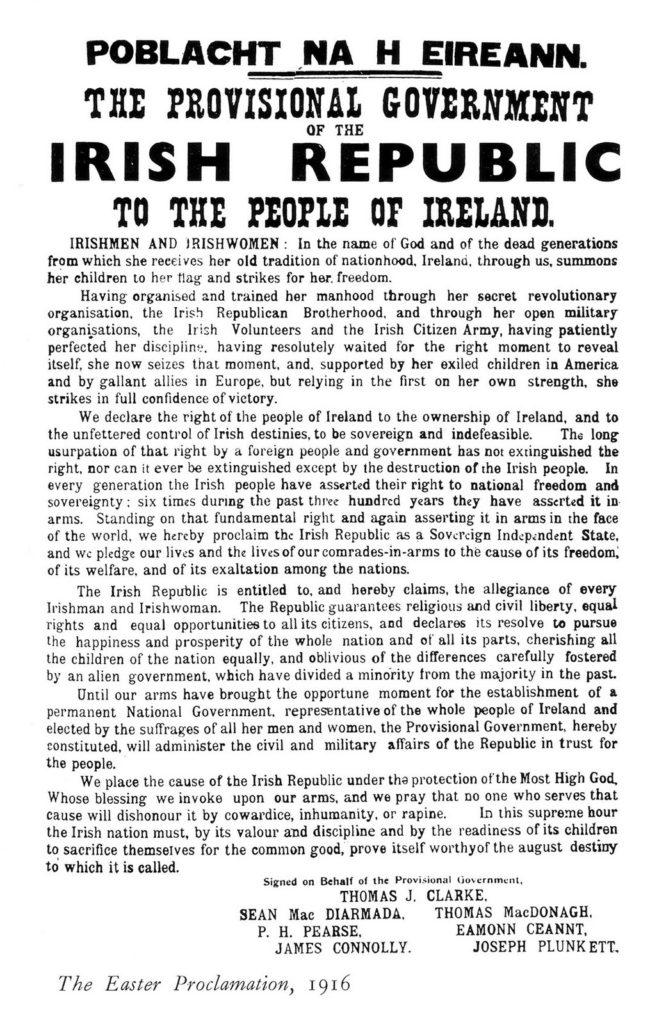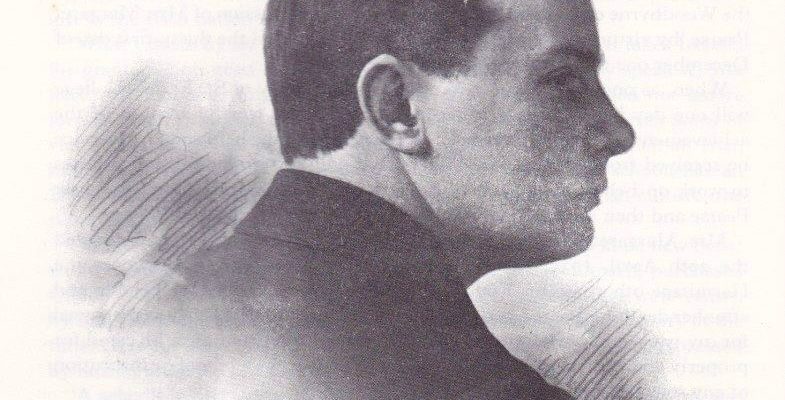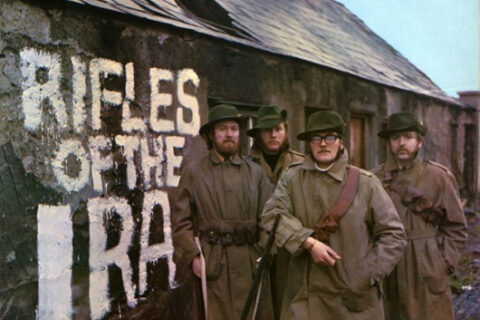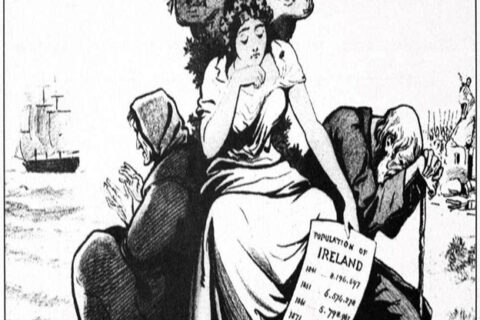The eldritch abomination in the heart of the Youtube algorithm fed me something good the other day, it does that occasionally, it needs me to keep clicking through for the ad revenue, so every now and then it serves up something juicy before redoubling it’s efforts to “deradicalize” me with unrequested videos about the BDS movement being “antisemitic,” or something with Charlie Kirk’s grinning hydrocephalitic-head in the thumbnail. The algorithm giveth and the algorithm taketh away. That good thing it gave me was a song, Óró sé do bheatha abhaile.
If you just reflexively offered a “gesundheit” or “bless you,” thanks, but the song is Gaelic. A language that sounds very strange to my ears, and one in which you don’t say hello, you say “God with you” and in which the polite reponse is “God and Mary with you,” though that’s being phased out, because, PissEarth. The origins of this particular song are obscure but it has become attached to various rebellious causes, the Jacobites may have used it at some point, it might be an old Irish clan marching song, other theories abound, but the version I heard of this very old song, had new lyrics written by Patrick Pearse in the twentieth century, and if you don’t know who Patrick Pearse is, well, neither did I until the song led me down a rabbit hole.
Let’s begin at the end of our story, with a quote from Patrick Pearse’s speech before the 1916 court-martial where he was sentenced to die, “when I was a child of ten, I went on my bare knees by my bedside one night and promised God that I should devote my Life to an effort to free my country. I have kept the promise (…) We seem to have lost; but we have not lost. To refuse to fight would have been to lose (…) If our deed has not been sufficient to win freedom, then our children will win it by a better deed,” and that is exactly what came to pass, though it took far less than a generation for Pearce’s dream of a free Irish Republic to be realized. Pearse strikes me as a different breed of man to most, when I was ten I was playing Jurassic Park on the Super Nintendo, not trying to overthrow an empire. If you’re still unsure of quite the caliber of man we’re talking about here, this is a quote from the British officer, Charles Blackader, who chaired the aforementioned court marital, “Here I have just done one of the hardest tasks I have ever had to do. I have had to condemn to death one of the finest characters I have ever come across. There must be something very wrong in the state of things that makes a man like that a rebel. I don’t wonder that his pupils adored him.”
Before he would arrive at that fateful court-martial, Patrick Pearse was an Irishman and a patriot, who held careers as a barrister, and, as you probably just realized, as a headmaster of the school he founded. Patrick Pearse would also find time however, to be a literal warrior poet, and one of the leaders of the armed Easter Rising in 1916 in Dublin against the British Empire. Which all leads back up to the court-martial we opened on “in media res,” which is considered the absolutely cheapest and worst possible way of starting a narrative. My bad.
Although not the focus here, Pearse truly was a renaissance man, and his thoughts on the English education system and it’s parallels to something like Common Core, or how your children are being lied to about their own history, would make a worthy article in itself. For now, just one quotation of his on education will suffice, “the system has aimed at the substitution for men and women of mere Things. It has not been an entire success. There are still a great many thousand men and women in Ireland. But a great many thousand of what, by way of courtesy, we call men and women, are simply Things (…) There is no education system in Ireland. The English have established the simulacrum of an education system, but its object is the precise contrary of the object of an education system. Education should foster; this education is meant to repress. Education should inspire; this education is meant to tame. Education should harden; this education is meant to enervate. (…) To the children of the free were taught all noble and goodly things which would tend to make them strong and proud and valiant; from the children of the slaves all such dangerous knowledge was hidden (…) It is because the English education system in Ireland had deliberately eliminated the national factor that it has so terrifically succeeded. For it has succeeded – succeeded in making slaves of us. And it has succeeded so well that we no longer realize that we are slaves. Some of us even think our chains ornamental, and are a little doubtful as to whether we shall be quite as comfortable and quite as respectable when they are hacked off.” I’m calling it now – Pearse is the progenitor of the NPC meme.
The best version of that song he wrote, the one Youtube foolishly introduced me to, giving birth to this article, is sung by The Wolf Tones, a pun based on the improbably named, Theobald Wolf Tone an Irish patriot who died for his cause in 1798, dying for the cause, being somewhat of a tradition for Irish Nationalists. Have a listen if you’re curious, though it really isn’t the focus of this article, Pearse is.
His version of the lyrics translate as follows:
Hail, oh woman, who was so afflicted,
It was our ruin that you were in chains,
Our fine land in the possession of thieves…
While you were sold to the foreigners!
Chorus:
Oh-ro, welcome home
Oh-ro, welcome home
Oh-ro, welcome home
Now that summer’s coming!
Grace O’Malley is coming over the sea,
Armed warriors as her guard,
Only Gaels are they, not French nor Spanish…
and they will rout the foreigners!
Chorus
May it please the King of Prodigy that we might see,
Although we may live but one week after,
Gráinne Mhaol and a thousand warriors…
Dispersing the foreigners!
Chorus
It should go without saying, but I’ll state it emphatically, that talk of warriors dispersing foreigners is not something anybody here is endorsing in a literal sense, you’re all big boys now, use your words. Nonetheless, I found the song affecting in a rhetorical sense, perhaps you did too? Either way, Pearse fascinates me. At his graveside oration for O’Donovan Rossa (who luckily isn’t the topic today, because what he stood for just comes across as 19th Century fedposting), Pearse proved to be a little green Pericles, this modern rendition of the famous speech is worth a listen if you have the 5 minutes, and if not, the most pertinent lines in the previous speech are “life springs from death, and from the graves of patriot men and women spring living nations.” Pearce then was aware of the costs involved in his goals of a free Irish State, but unlike myself he cared about his freedom truly, it was no mere hobby to him. I write anonymously because I fear for my livelihood, he did not value his life as highly as I value paying the rent.

What would ultimately be his undoing, or the making of him, depending on one’s perspective, was that Pearse was one of the signatories, and the man chosen to read aloud, the Proclamation of the Irish Republic outside the General Post Office in Dublin which marked the start of the Easter Rising in 1916. The armed Rising against the then largest empire on Earth, was a complete failure in the short term, defeated utterly militarily, but from the graves of those Irish patriots a new nation would indeed spring within 6 years. Devote your nation and your cause to God, and win in the long run, there’s a whitepill in there somewhere.
Pearce was, as we’ve touched on already, executed for his leadership role in this failed uprising. In the final letter he wrote from prison the day before his execution, he said “we have done right. People will say hard things of us now. But later they will praise us.” He could not have been more correct, even amongst the Irish he was hated for the most part in the immediate term, many had kin fighting for Britain in the trenches of France at the time and he was seen as a traitor. Righteous men made villains in the minds of the masses, stop me if you’ve heard this one before, you men of the South? James Joyce once said “Ireland is the old sow that eats her farrow,” it tends to at first despise, and then often to kill, it’s best statesmen and thinkers; Michael Collins comes immediately to mind. That being true, Pearce still won out in the end. He is generally lauded, I believe correctly, as a visionary, a hero, and a martyr. The man, once hated, is now turned into statues and stamps and such in his homeland. Prophetic words from Pearse then, but of course, a prophet is not without honour, except in his own town, among his own relatives, and in his own home.
There is one last thing to speak of, the other old sow that eats her farrow; modernity. In the interests of full disclosure, it’s worth pointing out that perception of Pearse has shifted a lot in recent years. Amongst liberals he is hated and described as a proto-fascist, because there is nothing new under the sun or out of the mouths of leftists. One wonders if his statues are long for this world. Also, from our side of things, it’s worth highlighting that the consensus in academia is now that Pearse was a repressed homosexual, the evidence being a poem he once wrote. I’ve read it, and it is admittedly a little fruity, but poetry as a category has a higher fruit content than Skittles, so who knows? Everything in our time is so sexualized, that the normal male bonding of a better age seems suspect to us, and even if he was a homosexual, he was a repressed Catholic one, and that is unequivocally the best category of homosexuals. *Angry Calvinist noises intensify*. As an aside, I had a look for the Wikipedia pages of the academics at the forefront of this revisionist history of Pearse, having the usual suspicions about the Early Life sections thereof, but unlike in America, it appears Irish academics aren’t generally taken seriously enough to merit their own Wikipedia pages. If that doesn’t give you a fondness for the nation Pearse helped to forge, nothing will.
-By Anon

O I’m a good old rebel, now that’s just what I am. For this “fair land of freedom” I do not care at all. I’m glad I fit against it, I only wish we’d won, And I don’t want no pardon for anything I done.






What is a good book to start with as a solid introduction to Pearse and the Irish uprising?
Very nice, my brother. May we lead such determined lives.
The passion of prophets and poets is uncommon to mere mortals, and therefore misunderstood or maligned by lesser men. 😉
who won in Lepanto then?
i’m pretty sure paganized modern Ireland is more based… oh actually, they love Hindi gay leaders…